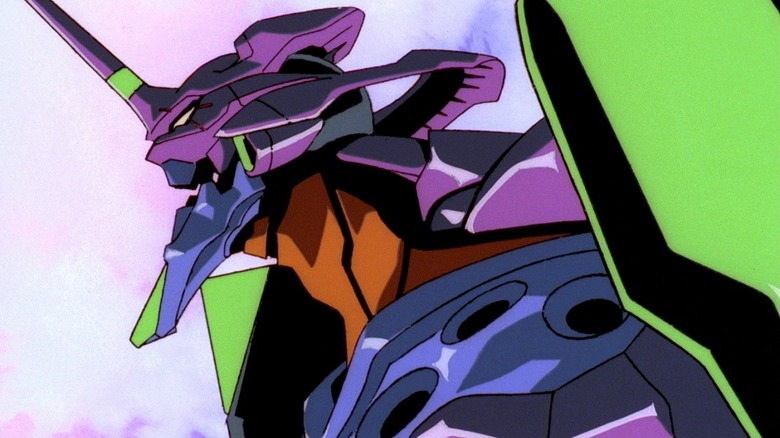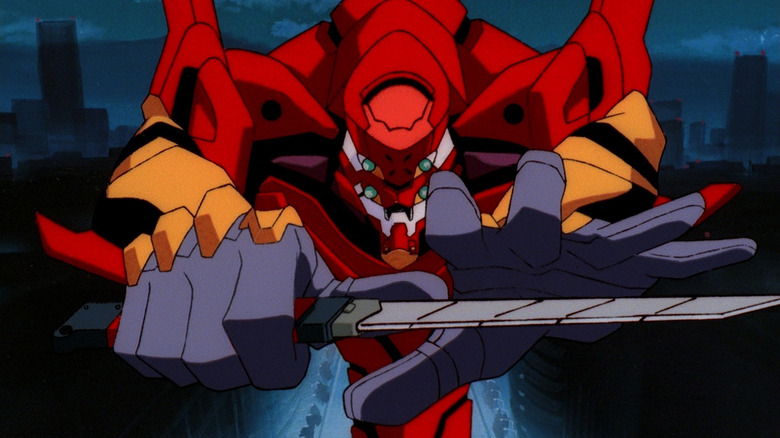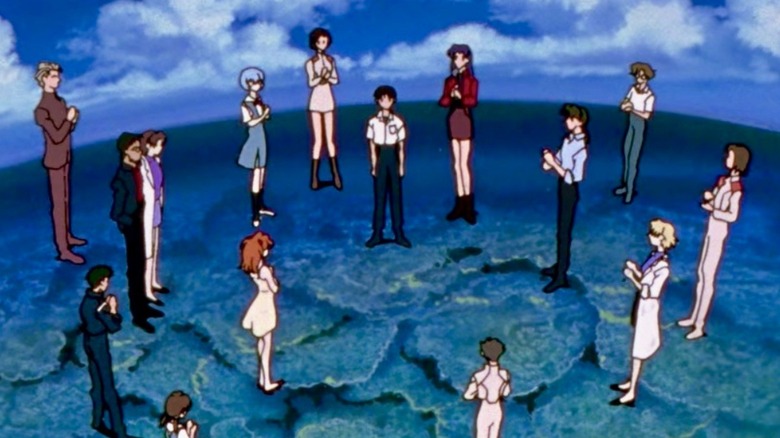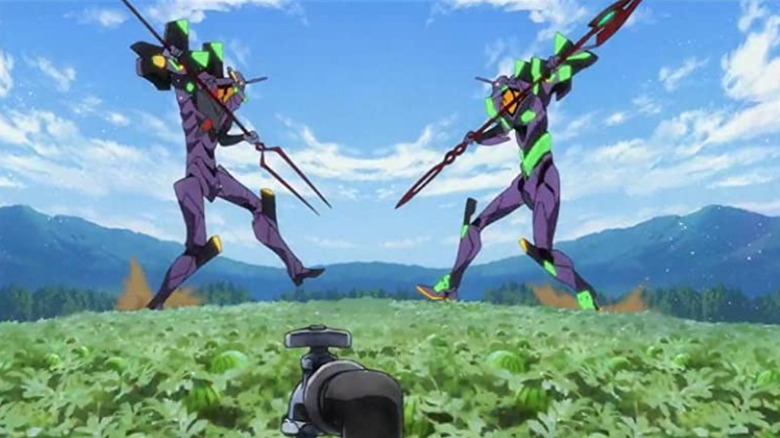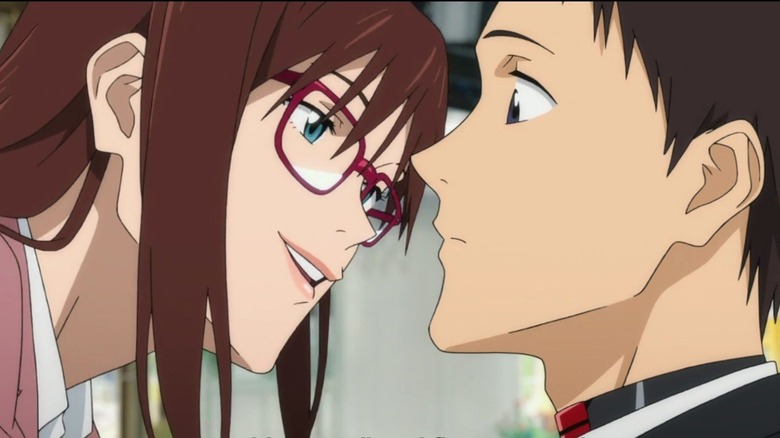Hideaki Anno Only Had One Goal For Neon Genesis Evangelion
It's been over a quarter-century since it first premiered, but "Neon Genesis Evangelion" remains a pop culture juggernaut. This is a series that helped usher in a new era for mecha anime, infusing it with a love of tokusatsu and enough symbolism and lore to fill entire wikis.
It's easy to see why. One of the best and catchiest opening theme songs, stunning fight scenes, an absolutely tear-jerking ending, and an incredible number of philosophical talks in a show ostensibly meant for teenage boys — "Neon Genesis Evangelion" was like no other show when it premiered. Or today, even.
The show is set 15 years after half the human population perished in an apocalyptic event known as "The Second Impact." As a result, strange creatures known as "Angels" constantly attack the city of Tokyo-3. The only way to protect the city is by entrusting actual children with piloting giant humanoid robots known as Evangelions, which can fight against the Angels.
One thing that makes "Evangelion" so unique in the anime landscape is its connection to its creator, Hideaki Anno, who poured his obsessions and depression into the show and used it as a tool for self reflection and betterment. The result continues to inspire and influence visuals and storytelling in anime to this day, and is a lesson in making complex and nuanced character arcs that change over time.
Major spoilers ahead for "Neon Genesis Evangelion" and the "Rebuild of Evangelion" movies ahead.
'To live is to change'
Though the first half of the show does follow some rather standard mecha anime tropes, like the Villain Of The Week and the Boy Pilot, it became quite clear quite quickly that this is something new. For one, protagonist Shinji Ikari was far from eager to become a hero — he doesn't refuse the call of adventure as much as he literally runs away from responsibility and cowers in fear. The rest of the ensemble is not made up of heroic archetypes, but of deeply messed-up people with their own problems and struggles.
Even before the series premiered, Anno released a statement with his plans for the story. "They say, 'To live is to change,'" Anno wrote. "I started this production with the wish that once the production complete, the world, and the heroes would change. That was my 'true' desire."
His other goal for the show was to make something he could pour himself into and infuse with his own insecurities.
"I tried to include everything of myself in Neon Genesis Evangelion-myself, a broken man who could do nothing for four years. A man who ran away for four years, one who was simply not dead. Then one thought. 'You can't run away,' came to me, and I restarted this production. It is a production where my only thought was to burn my feelings into film."
He definitely achieved that. Halfway through the series' run, Anno started infusing the show with his own life's struggles and his newly discovered ideas about depression and mental health. The result was a far bleaker and more tragic show, one far more interested in introspective therapy sessions as entire episodes than in flashy battles. That, combined with a budget that was starting to run out, resulted in more philosophical ideas and experimental animation.
And to all the children ... congratulations!
These ideas culminated in the two-part finale, which is still talked about to this day as one of the most bizarre, but also emotionally powerful endings to an anime ever made. In the finale, we learn Shinji activated the "Human Instrumentality Project," an apocalyptic, pseudo-Biblical event where the souls of all humans meld into a single consciousness. Not that we see any of it, as we experience it all through a series of bizarre vignettes inside Shinji's mind, as he confronts his existence, his depression, and his own reality.
The series ends with Shinji deciding to embrace life, saying "I want to be me! I want to be here! And it's okay for me to be here!" Before all his friends and family congratulate him for his breakthrough in an iconic scene that has been paid homage to and parodied to death in the years since. Even "Steven Universe" did its own take on it!
"Eva is a story that repeats"
In the statement, Anno concludes that he doesn't know exactly what the result of the show will be, how it will end, or what will happen to Shinji and the other characters. "I don't know where life will take them. Because I don't know where life is taking the staff of the production," he wrote at the time. So, of course, "Evangelion" didn't truly end with the series.
With the incredible success of the anime, a feature film titled "The End of Evangelion" was released, meant to close the book on the story and retell the final two episodes. There was a manga adaptation, video games based on the franchise, and more, each telling their own slightly different version of the story. Then, just over a decade after the original series ended, Anno got back in the robot once again.
In 2006, it was announced that Anno would work on a film trilogy set to remake the story of the show, titled "Rebuild of Evangelion." In a statement from 2007, Anno described "Eva" as a "Story that repeats," saying it is "a story where the main character witnesses many horrors with his own eyes, but still tries to stand up again. It is a story of will; a story of moving forward, if only just a little."
And just like the original "Evangelion," the remake movies completely changed course halfway through. Where the first two mostly followed the story of the series beat-by-beat, the last two movies went completely off-the-rails and branched off to tell an entirely new story.
Bye bye, all of Evangelion
Which brings us to 2021's "Evangelion: 3.0+1.0: Thrice Upon a Time," a movie that both comments on and builds upon the original ending, while splicing in all the ways Anno had changed in-between both projects. If the original show was Anno accepting his flaws and deciding it was okay for him to embrace life, then "Evangelion: 3.0+1.0: Thrice Upon a Time" is Anno telling us he's changed for the better and even found happiness, so his characters end up in as happy a place as they can get.
The third movie, "Evangelion: 3.0 You Can (Not) Redo" even introduced the idea that the Eva pilots quite literally cannot age, a poignant piece of meta commentary on anime characters not being allowed to age or change much due to the never-ending franchise machine that keeps churning out spin-offs and merchandise. Then "Thrice Upon a Time" shatters that idea, as the the film ends with Shinji creating a new world entirely free of Evas, before we cut to a grown up Shinji smiling for once, and embracing life next to a girl he likes.
For a franchise so intrinsically connected to the psyche of its creator, the biggest thing "Evangelion" achieved was fulfilling Anno's goal from all those years earlier — making a story that changes. If there's a lesson to take from "Neon Genesis Evangelion" and the franchise at large, is that we can all change, we can all embrace our flaws and our traumas, and decide they are not enough to prevent us from enjoying life. After all, if Shinji Ikari can get out of the robot and go outside, so can we.
